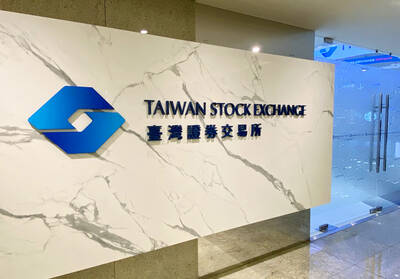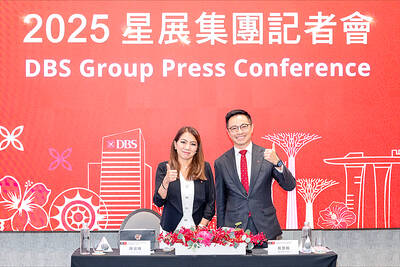Innolux Corp (群創) yesterday announced that it would expand its capacities for smartphone displays with 18:9 aspect ratio to cope with fast-growing demand from Chinese smartphone producers.
Innolux is the LCD manufacturing arm of Hon Hai Precision Industry Co (鴻海精密).
Chinese smartphone makers are gearing up for launches of new models, featuring edge-to-edge displays with 18:9 aspect ratio to give a wide-viewing angel, Innolux said, as they usually follow the specifications of Apple’s new iPhones.
Apple launched its iPhone 8 and iPhone X series on Tuesday last week.
“We believe half of new smartphones next year will feature 18:9 displays,” Jeffrey Yang (楊弘文), vice president of Innolux’s mobile display product unit, told a media briefing in Taipei.
“Almost all of our customers now plan to adopt such wide angle view displays for their new phones, either for mid-range models or for high-range ones,” Yang said.
However, the penetration rate of such wide angel displays will be low this year as earlier adopters of the new technology are limited to industry leaders such as Apple and Samsung Electronics Co, he said.
Innolux plans to ship a small volume of 5.7-inch and 5.9-inch displays with 18:9 aspect ratio for smartphones next quarter, Yang said.
To satisfy customers’ rapidly increasing demand, Innolux plans to convert part of a sixth-generation production line in Miaoli County to expand its capacities for this type of handset displays as well as for displays used in high-end gaming laptops and game consoles, he said.
Once the conversion is completed, Innolux will add 20,000 sheets to 40,000 sheets of mother glass wide-viewing-angel smartphone displays and high-end laptop displays, he said.
Innolux chairman Wang Jyh-chao (王志超) told the briefing that “the [LCD] market demand is better than I expected.”
“It looks healthy. The stability is to extend to the rest of this year,” Wang added.
Earlier, Wang had said he thought the uptrend, which began in the second half of last year, could end in the second half of this year because at 12 months, it was the longest upcycle in the history of the industry.
Innolux attributed the longer-than-expected momentum to ongoing cathode-ray-tube TV replacement demand in emerging markets and brisk demand for bigger-screen TVs in the US and Europe, while Chinese LCD panel makers are facing bottlenecks in producing high-end TV panels supporting better colors and higher resolutions.
AU Optronics Corp (AUO, 友達光電) chairman and chief executive officer Paul Peng (彭双浪) was also optimistic yesterday, saying “the industry has entered a stable period and hopefully it will carry on into the future.”
“We found that channel inventories have reduced rapidly to a healthy level after TV panel prices dipped in July. We are seeing strong TV customer demand in the third and fourth quarters, which are the peak season for the [TV] industry,” Peng said.
Due to robust demand for phone and TV displays, AUO’s factories are running at high utilization, he said.

Taiwan Semiconductor Manufacturing Co (TSMC, 台積電) secured a record 70.2 percent share of the global foundry business in the second quarter, up from 67.6 percent the previous quarter, and continued widening its lead over second-placed Samsung Electronics Co, TrendForce Corp (集邦科技) said on Monday. TSMC posted US$30.24 billion in sales in the April-to-June period, up 18.5 percent from the previous quarter, driven by major smartphone customers entering their ramp-up cycle and robust demand for artificial intelligence chips, laptops and PCs, which boosted wafer shipments and average selling prices, TrendForce said in a report. Samsung’s sales also grew in the second quarter, up

LIMITED IMPACT: Investor confidence was likely sustained by its relatively small exposure to the Chinese market, as only less advanced chips are made in Nanjing Taiwan Semiconductor Manufacturing Co (TSMC, 台積電) saw its stock price close steady yesterday in a sign that the loss of the validated end user (VEU) status for its Nanjing, China, fab should have a mild impact on the world’s biggest contract chipmaker financially and technologically. Media reports about the waiver loss sent TSMC down 1.29 percent during the early trading session yesterday, but the stock soon regained strength and ended at NT$1,160, unchanged from Tuesday. Investors’ confidence in TSMC was likely built on its relatively small exposure to the Chinese market, as Chinese customers contributed about 9 percent to TSMC’s revenue last

Taiwan and Japan will kick off a series of cross border listings of exchange-traded funds (ETFs) this month, a milestone for the internationalization of the local ETF market, the Taiwan Stock Exchange (TWSE) said Wednesday. In a statement, the TWSE said the cross border ETF listings between Taiwan and Japan are expected to boost the local capital market’s visibility internationally and serve as a key for Taiwan becoming an asset management hub in the region. An ETF, a pooled investment security that is traded like an individual stock, can be tracked from the price of a single stock to a large and

Despite global geopolitical uncertainties and macroeconomic volatility, DBS Bank Taiwan (星展台灣) yesterday reported that its first-half revenue rose 10 percent year-on-year to a record NT$16.5 billion (US$537.8 million), while net profit surged 65 percent to an unprecedented NT$4.4 billion. The nation’s largest foreign bank made the announcement on the second anniversary of its integration with Citibank Taiwan Ltd’s (花旗台灣) consumer banking business. “Taiwan is a key market for DBS. Over the years, we have consistently demonstrated our commitment to deepening our presence in Taiwan, not only via continued investment to support franchise growth, but also through a series of bolt-on acquisitions,” DBS